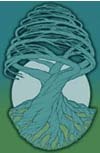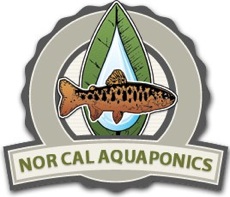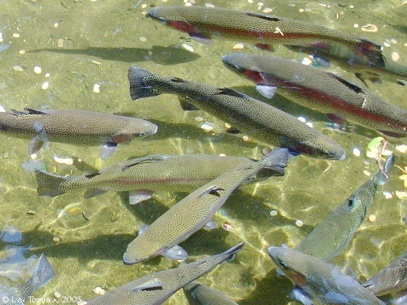








Home | About Us | Contact Us | Store

2008, Living Mandala
creative services by: 360 Degrees
In Association With
Nor Cal Aquaponics
Mendocino Ecological Learning Center
Instructors
Max Meyers
& Guests
What is Aquaponics?
What if there was way to produce an abundance of organic food using up to 90% less water, while producing up to ten times more food in the same amount of area and time? What if you could achieve this using 1/4 the amount of energy, in a system that is totally scaleable, does not require fertile soil, saves you time and labor, makes you a good living and is incredibly sustainable? Well the exciting news is that such a system of farming exists... it’s called Aquaponics.
Aquaponics is a combination of Aquaculture and Hydroponics. It is one of the most sustainable and productive farming systems in the world. At a time of global climate change, depletion of resources, pollution of water and huge losses of top soil worldwide, there has never been a more important time to learn about Aquaponics.
Join us for this weekend intensive to learn how Permaculture based Aquaponics can produce large amounts of organic food using only a fraction of the resources, time and energy needed in other methods of farming. You will lean basic system designs for several systems, and also look at business models that can be applied towards turning this exciting technology into a thriving business.
Course Description
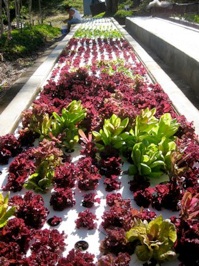
Course Includes
This Aquaponics with Applied Permaculture weekend intensive includes: a detailed exploration into aquaponics; system designs from all over the world; its design, functions, adaptability, uses, variations and improvements; and over 30 pages of course materials. We will touch on basic formulas, calculations, estimates, guidelines, business models, permaculture design integration, and more. This course is intended to give you an in depth introduction to creating integrated regenerative aquaponics systems.
Permaculture & Aquaponics
By bringing Permaculture Design principles and practices into Aquaponics, we are closing many loops, inefficiencies, and energy drains that exist in more conventional systems, as well as integrating the system appropriately into the larger landscapes and ecologies it is a part of, making it a much more holistic and sustainable enterprise. Closed-Loop Aquaponics focuses on designing aquaponics systems that that produce as much of the system’s needs (water, energy, fish, feed, heat, gas, etc.) on-site and within the system itself as possible. Products of the systems can include; solar electricity, solar heated air, solar heated water, fish, prawns, vegetables, fruit, aquatic plants, algae, minnows, snails, worms, dry and liquid fertilizers, methane gas, and more. By using the Permaculture Design process, we learn to design systems appropriate to diverse climates and unique ecological niches to meet various conditions, needs, dreams, and desires.

Contact
For questions and more information regarding the course
e-mail: aquaponics@livingmandala.com or
call: (707) 634-1461
To Register for the Weekend Aquaponics Intensive
Watch a Video of Max Meyers Featured in Time Magazine On-Line
http://www.time.com/time/video/player/0,32068,658160623001_2030619,00.html
Tuition & Registration
Light beverages and snacks will be provided. Participants are responsible for their own lunch. You can bring your own lunch, or opt to purchase a catered lunch for an additional $10.
Standard Tuition: $345
Early Bird: $295 (available for the first 12 registrants)
Permaculture Design Course Graduates, Aquaponics Course Grads, & College Students: $250
We are offering a special discount to Permaculture Design Course Graduates, Aquaponics Course Graduates, and college students.
* There will be a small registration fee in addition to the above prices.
To Register for the Aquaponics Course Click Here.
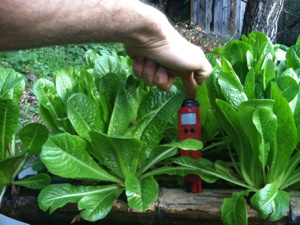
Snail Mail
To complete your registration via mail (which is preferred), register on-line and send the full name of the course registrant(s) with a check or money order out to "Living Mandala" and mail to:

Living Mandala
Attn: Aquaponics Training
30 Castro Ave
San Rafael, CA
Refund Policy
Cancellations up to 1 week before the course before April 6 will be refunded, excluding a $25 processing fee. No refunds are given after Aril 6, but may be credited towards a future course with Living Mandala (minus the processing fee). Not all courses apply.
Aquaponics Facts
-
•AQUAPONICS USES 90% LESS WATER THAN CONVENTIONAL FARMING DOES!
-
•AQUAPONICS IS ENERGY-EFFICIENT: IT REQUIRES ONE-THIRD OF THE ENERGY OTHER FARMING SYSTEMS USE!
-
•AQUAPONICS HAS EIGHT TO TEN TIMES MORE VEGETABLE PRODUCTION IN THE SAME AREA AND TIME!
-
•LABOR IS REDUCED AS MUCH AS 40% AND MANY USEFUL BYPRODUCTS ARE CREATED THAT CAN BE USED TO FARM OTHER CROPS, TREES, SOIL, WATER AND ENERGY!
-
•A PERMACULTURE INSPIRED SYSTEM PRODUCES ALL OF THE SYSTEM’S NEEDS (WATER, ENERGY, FISH FEED, HEAT, ETC.) ON SITE!
-
•PRODUCTS OF THE SYSTEM INCLUDE; SOLAR ELECTRICITY, HEAT, FISH, PRAWNS, VEGETABLES, AQUATIC PLANTS, ALGAE, SNAILS, WORMS, FERTILIZER, EVEN METHANE GAS!
Site Details - The the Venture Greenhouse
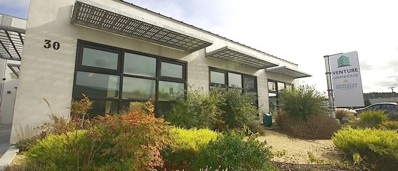
The Venture Greenhouse of Dominican University of California is a pioneering, early-stage business incubator providing an intensive acceleration process for growing companies that have the potential for significant environmental and social benefits. Located in San Rafael, California, the 5,000 sq. ft. “innovation engine” houses up to 12 companies at a time, with the goal of graduating companies within one year.
Inspired by Dominican’ s groundbreaking Green MBA program, the Venture Greenhouse is a growth accelerator for budding social and environmental entrepreneurs, a learning laboratory for the University’s business students, and a community resource for innovators, investors, sustainability advocates and new ventures. The Venture Greenhouse is the leading innovation and venture creation catalyst addressing critical social and environmental issues, to support humanity thriving within the planet’s ecological means.
Their mission is to accelerate the success of environmentally and socially beneficial ventures by providing a broad array of resources to entrepreneurs from Dominican University of California and beyond. The Venture Greenhouse has a globally collaborative network of enterprises, professionals and partners who contribute to vibrant and sustainable economic development for Marin County and the Bay Area.


Instructors
Max Meyers
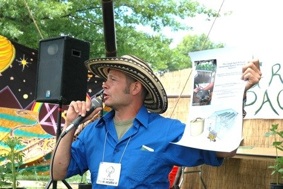
Lead Instructor
Affiliate Organizations & Sponsors
Become a sponsor or affiliate of this course!
For details email: sponsors@livingmandala.com
Aquaponics With Applied Permaculture
Foundational Systems Design
Weekend Intensive: Aug 31 - Sept 1, 2013
Venture Greenhouse, San Rafael, California

